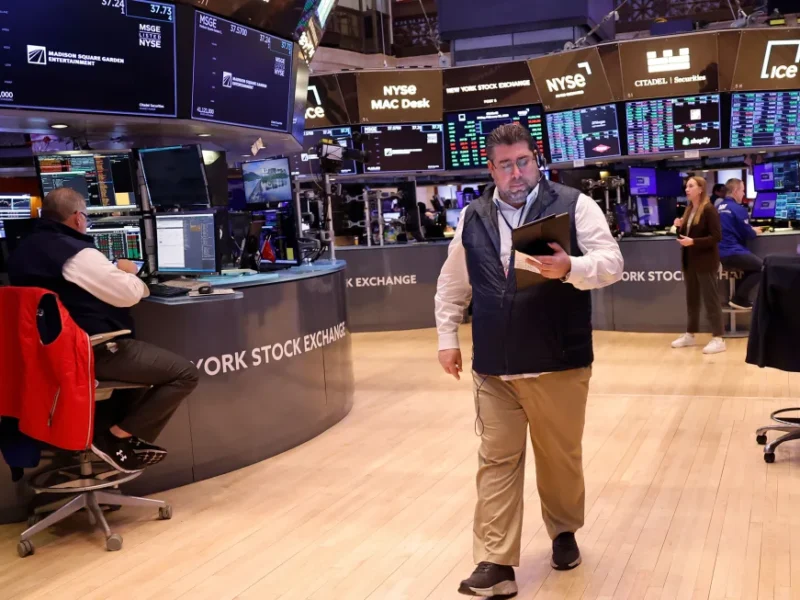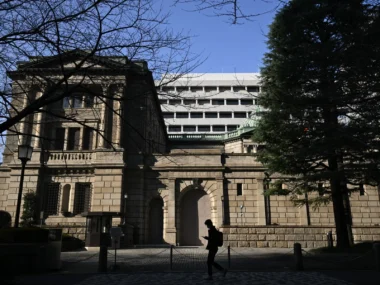The recent market rally has been remarkable, with stocks experiencing an extraordinary winning streak since late October. Just last week, the S&P 500 reached a new all-time high, achieving its best performance in a year. Concurrently, borrowing costs have fallen to their lowest level in two years, signaling a brighter economic outlook. However, this nearly unprecedented surge in the markets has sparked concerns regarding its sustainability and the driving forces behind it.
Nvidia and other artificial intelligence stocks continued their ascent on Monday, further propelling the market to new heights. Blockbuster earnings from Nvidia fueled a broad market rally, leading both the S&P 500 and Dow to record levels, with the tech-heavy Nasdaq Composite also reaching its highest point in over a year. Additionally, various sectors such as Health Care, Industrials, and Tech, along with 28 other sub-industries in the S&P 500, reached new highs last week, as highlighted by Sam Stovall, chief investment strategist at CFRA. With less than a week remaining in February, all three major indexes are on track to end the month higher.
Yet, this is not just an ordinary rally; these market gains are nearly unprecedented. The S&P 500 has advanced in 15 out of the last 17 weeks, a feat observed only once before in the last 50 years, according to analysts at Deutsche Bank. If markets remain positive this week, they will equal the record for consecutive winning weeks last achieved in 1971.
The surge in the market is largely attributed to the AI boom, with Nvidia and other tech giants leading the charge. This momentum has significantly outpaced broader market gains, with key economic indicators remaining strong and inflation trending lower. Federal Reserve officials have hinted at potential interest rate cuts this year, further boosting confidence on Wall Street.
However, concerns linger regarding the sustainability of this rally. Analysts caution that the market’s narrow focus on the tech sector and insufficient breadth could make it vulnerable. Additionally, inflation remains a concern, with fears that it could persist at elevated levels, potentially delaying expected rate cuts by the Fed.
Investors will closely monitor upcoming economic data, including January’s PCE report, the Fed’s preferred inflation gauge, and personal income and spending data, to gauge the trajectory of the market moving forward.
Warren Buffett has suggested that Berkshire Hathaway’s exceptional growth may be reaching its zenith as the company edges closer to a $1 trillion valuation.
Berkshire Hathaway approached a $1 trillion market valuation on Monday following a record-breaking year, but CEO Warren Buffett cautioned in his annual letter to investors that further extraordinary performances might be a thing of the past, according to reports from my colleague Eva Rothenberg.
Shares of Berkshire Hathaway (BRK.B) surged nearly 2% to $429 on Monday morning after closing with a market capitalization of $905 billion on Friday. Joining the ranks of only a few companies globally, such as tech giants Amazon, Apple, and Microsoft, Berkshire Hathaway is nearing the coveted $1 trillion milestone.
The conglomerate, headquartered in Omaha, Nebraska, disclosed a record cash reserve in its fourth-quarter earnings report on Saturday. Berkshire now holds approximately $167.6 billion in cash and equivalents, surpassing last quarter’s record-high of $157.2 billion. Additionally, operating earnings for the year rose to $37.3 billion, following a record-setting $30.8 billion in 2022.
However, in his annual letter to shareholders over the weekend, Buffett tempered expectations. He stressed the company’s focus on longevity and consistency, suggesting that seismic deals and remarkable performance may be unlikely in the future.
Buffett emphasized, “Berkshire should do a bit better than the average American corporation and, more importantly, should also operate with materially less risk of permanent loss of capital.” He cautioned against expecting anything beyond modest improvements, dismissing hopes for significant gains.
Buffett highlighted the limited opportunities for Berkshire Hathaway to invest in or acquire companies that could significantly impact its performance. Particularly outside the United States, Buffett noted a lack of meaningful options for capital deployment, stating, “There are essentially no candidates that are meaningful options for capital deployment at Berkshire.”
The CEO of Kellogg’s reportedly suggested a solution of having people eat Corn Flakes for dinner.
Kellogg’s CEO Gary Pilnick’s advice, suggesting “Let them eat Corn Flakes,” has drawn attention amid reports of cash-strapped shoppers allocating the highest portion of their income to food in the past 30 years.
In a recent CNBC interview, WK Kellogg CEO Pilnick mentioned the company’s promotion of cereal for dinner as a more budget-friendly option for consumers. The ad’s tagline, “Give chicken the night off,” accompanies this cheerful campaign, featuring cereals like Frosted Flakes, Froot Loops, Corn Flakes, Raisin Bran, among others.
Pilnick highlighted the affordability of cereals, stating that they have historically been a cost-effective choice, especially during times of financial strain. He compared the cost of cereal for a family to alternative dinner options, suggesting that it is a more economical choice.
However, Pilnick’s advice has been met with criticism, particularly from individuals frustrated by the significant increase in grocery expenses since 2020. On social media, the campaign is viewed as insensitive.
When questioned by CNBC host Carl Quintanilla about the potential negative reception to encouraging exhausted customers to have cereal for dinner, Pilnick expressed a different perspective. He noted that the idea is actually resonating well with consumers, suggesting that cereal for dinner is a trend that is gaining traction, particularly among those facing financial pressure.











